六年级 形容词的比较级和最高级
- 格式:doc
- 大小:23.00 KB
- 文档页数:2
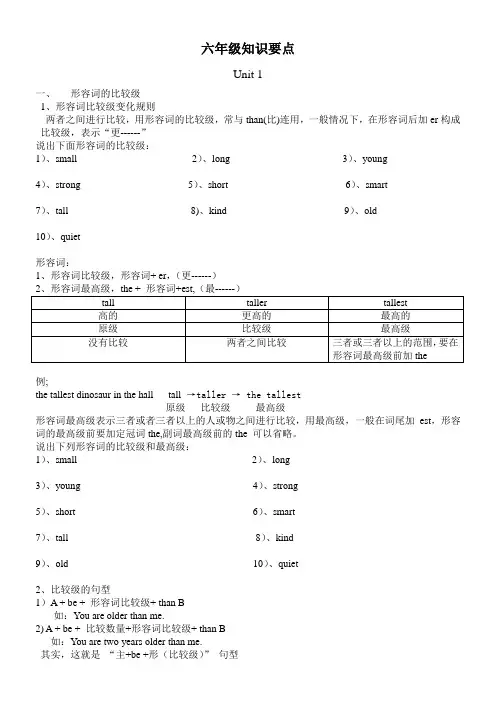
六年级知识要点Unit 1一、形容词的比较级1、形容词比较级变化规则两者之间进行比较,用形容词的比较级,常与than(比)连用,一般情况下,在形容词后加er构成比较级,表示“更------”说出下面形容词的比较级:1)、small __________ 2)、long __________ 3)、young __________ 4)、strong __________ 5)、short __________ 6)、smart __________ 7)、tall __________ 8)、kind __________ 9)、old __________ 10)、quiet __________形容词:1、形容词比较级,形容词+ er,(更------)例;the tallest dinosaur in the hall tall→taller → the tallest原级比较级最高级形容词最高级表示三者或者三者以上的人或物之间进行比较,用最高级,一般在词尾加est,形容词的最高级前要加定冠词the,副词最高级前的the 可以省略。
说出下列形容词的比较级和最高级:1)、small __________ __________ 2)、long __________ __________3)、young __________ __________ 4)、strong __________ __________5)、short __________ __________ 6)、smart __________ __________7)、tall __________ __________ 8)、kind __________ __________9)、old __________ __________ 10)、quiet __________ __________2、比较级的句型1)A + be + 形容词比较级+ than B如:You are older than me.2) A + be + 比较数量+形容词比较级+ than B如:You are two years older than me.其实,这就是“主+be +形(比较级)”句型知识拓展:比较级和最高级要同类之间进行比较Zhang Peng’s bag is bigger than Sarah’s bag. = Zhang Peng’s bag is bigger than Sarah’s. 名词所有格所修饰的词,如果前面有提到过,往往可以省略,避免重复。
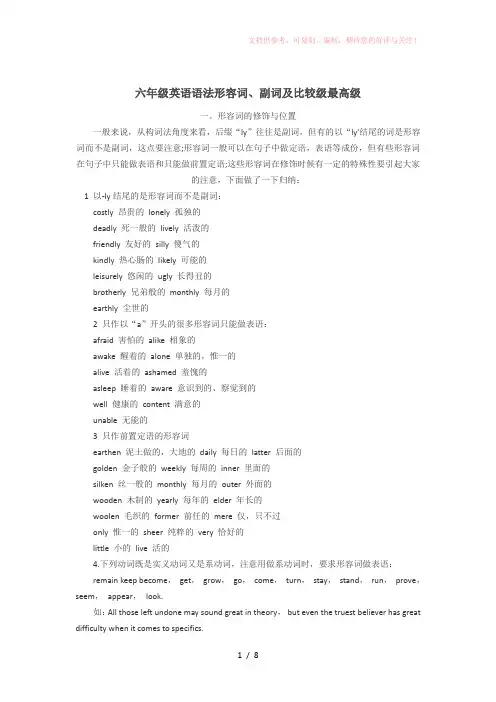
六年级英语语法形容词、副词及比较级最高级一。
形容词的修饰与位置一般来说,从构词法角度来看,后缀“ly”往往是副词,但有的以“ly'结尾的词是形容词而不是副词,这点要注意;形容词一般可以在句子中做定语,表语等成份,但有些形容词在句子中只能做表语和只能做前置定语;这些形容词在修饰时候有一定的特殊性要引起大家的注意,下面做了一下归纳:1 以-ly结尾的是形容词而不是副词:costly 昂贵的lonely 孤独的deadly 死一般的lively 活泼的friendly 友好的silly 傻气的kindly 热心肠的likely 可能的leisurely 悠闲的ugly 长得丑的brotherly 兄弟般的monthly 每月的earthly 尘世的2 只作以“a”开头的很多形容词只能做表语:afraid 害怕的alike 相象的awake 醒着的alone 单独的,惟一的alive 活着的ashamed 羞愧的asleep 睡着的aware 意识到的、察觉到的well 健康的content 满意的unable 无能的3 只作前置定语的形容词earthen 泥土做的,大地的daily 每日的latter 后面的golden 金子般的weekly 每周的inner 里面的silken 丝一般的monthly 每月的outer 外面的wooden 木制的yearly 每年的elder 年长的woolen 毛织的former 前任的mere 仅,只不过only 惟一的sheer 纯粹的very 恰好的little 小的live 活的4.下列动词既是实义动词又是系动词,注意用做系动词时,要求形容词做表语:remain keep become,get,grow,go,come,turn,stay,stand,run,prove,seem,appear,look.如:All those left undone may sound great in theory,but even the truest believer has great difficulty when it comes to specifics.一般来说,中文意思是“……的”的词是形容词,而中文意思是“……地”的词是副词。
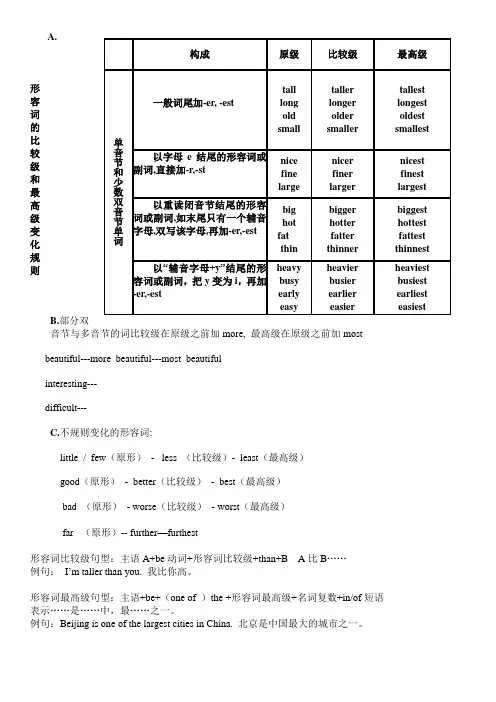
A.形容词的比较级和最高级变化规则B.部分双音节与多音节的词比较级在原级之前加more, 最高级在原级之前加most beautiful---more beautiful---most beautifulinteresting---difficult---C.不规则变化的形容词:little / few(原形)- less (比较级)- least(最高级)good(原形)- better(比较级)- best(最高级)bad (原形)- worse(比较级)- worst(最高级)far (原形)-- further—furthest形容词比较级句型:主语A+be动词+形容词比较级+than+B A比B……例句:I’m taller than you. 我比你高。
形容词最高级句型:主语+be+(one of )the +形容词最高级+名词复数+in/of短语表示……是……中,最……之一。
例句:Beijing is one of the largest cities in China. 北京是中国最大的城市之一。
写出以下各形容词的比较级和最高级:1. nice ______________________2. fat ____________________3. slow _____________________4. dry ____________________5. happy ____________________6. wet ____________________7. much ____________________ 8. ill _____________________9. little _____________________ 10. bad ___________________11. thin ______________________ 12. far ____________________13. early _____________________ 14. careful_________________15. exciting ___________________ 16. busy __________________2. 根据句意,用所括号内所级形容词的比较等级形式填空:1. Mr. Smith is _________ man in this office. (rich)2. Winter is _________ season of the years. (cold)4. It is much _______ today than yesterday. (hot)5. She is a little ________ than her classmates. (careful)6. ________ people came to the meeting than last time. (many)7. Which book is ________, this one or that one? (easy)8. My room is _______ than yours. (small)9. Hainan is _______ from Beijing than Hunan. (far)10. Skating is _______ than swimming. (exciting)11. Jim is _______ than all the others. (honest)12. Things are getting _______ and _______. (bad)13. The higher you climb, the _______ it will be. (cold)14. Now his life is becoming ________ and _______. (difficult)用适当形式填空:1. Bob is _________ ( young ) than Fred. but ___________ (tall) than Fred.2. Almost all the students' faces are the same ,but Li Deming looks _______ (fat) than before after the summer holidays.3.Which is _________ (heavy), a duck or a chicken?5.-- How _________ (tall) is Sally?--She' s 1.55 metres ________ (tall). What about Xiaoling? -- She' s only 1.40 metres ________ (tall).She is much _______ (short) than Sally.She is also the _______ (short) girl in the class.6. He is ______ (bad) at learning maths. He is much _______ (bad) at Chinese and he is the _________ (bad) at English.7. Annie says Sally is the ________ (kind) person in the world.8. He is one of the_________(friendly) people in the class, I think.9. A dictionary is much _________ (expensive) than a story-book.10. An orange ia a little ______ (big) than an apple, but much ________ (small) than a watermelon.11. The Changjiang River is the _______ (long) river in China.12. Sue is a little ___________ (beautiful) than her sister.14.--How difficult is physics?--I' m not sure.-- Is it ________ (difficult) than maths?-- I don' t think so.15.-- Annie plays the piano very ___________ (well).-- Sue plays it _____ (well) than Annie.And Sally plays it the __________ (well).16. Saturday is my _________ (busy) day in a week.17. Her mother is getting ____________(fat) and ________ (fat).18. I think it' s too expensive. I' d like a _____________ (cheap) one.19. He comes to school much ____________ (early) than I.21. Your classroom is __________(wide)and ___________(bright) than ours.22. Practise as __________ (much) as you can.23. The ________ (much), the ____________ (good).24. Nowadays(现在) English is __________( important )than any other subject, 1 think.。
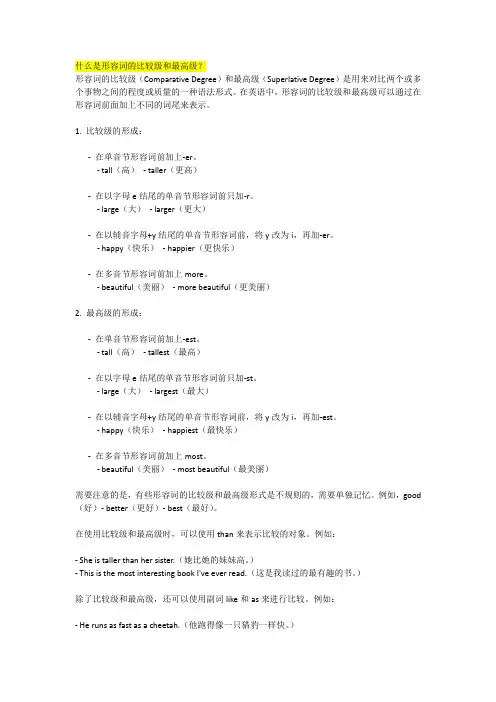
什么是形容词的比较级和最高级?形容词的比较级(Comparative Degree)和最高级(Superlative Degree)是用来对比两个或多个事物之间的程度或质量的一种语法形式。
在英语中,形容词的比较级和最高级可以通过在形容词前面加上不同的词尾来表示。
1. 比较级的形成:-在单音节形容词前加上-er。
- tall(高)- taller(更高)-在以字母e结尾的单音节形容词前只加-r。
- large(大)- larger(更大)-在以辅音字母+y结尾的单音节形容词前,将y改为i,再加-er。
- happy(快乐)- happier(更快乐)-在多音节形容词前加上more。
- beautiful(美丽)- more beautiful(更美丽)2. 最高级的形成:-在单音节形容词前加上-est。
- tall(高)- tallest(最高)-在以字母e结尾的单音节形容词前只加-st。
- large(大)- largest(最大)-在以辅音字母+y结尾的单音节形容词前,将y改为i,再加-est。
- happy(快乐)- happiest(最快乐)-在多音节形容词前加上most。
- beautiful(美丽)- most beautiful(最美丽)需要注意的是,有些形容词的比较级和最高级形式是不规则的,需要单独记忆。
例如,good (好)- better(更好)- best(最好)。
在使用比较级和最高级时,可以使用than来表示比较的对象。
例如:- She is taller than her sister.(她比她的妹妹高。
)- This is the most interesting book I've ever read.(这是我读过的最有趣的书。
)除了比较级和最高级,还可以使用副词like和as来进行比较。
例如:- He runs as fast as a cheetah.(他跑得像一只猎豹一样快。

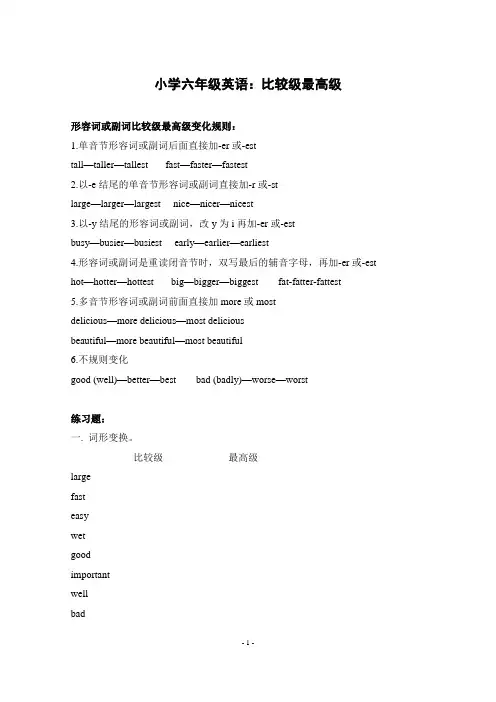
小学六年级英语:比较级最高级形容词或副词比较级最高级变化规则:1.单音节形容词或副词后面直接加-er或-esttall—taller—tallest fast—faster—fastest2.以-e结尾的单音节形容词或副词直接加-r或-st large—larger—largest nice—nicer—nicest3.以-y结尾的形容词或副词,改y为i再加-er或-est busy—busier—busiest early—earlier—earliest4.形容词或副词是重读闭音节时,双写最后的辅音字母,再加-er或-est hot—hotter—hottest big—bigger—biggest fat-fatter-fattest5.多音节形容词或副词前面直接加more或mostdelicious—more delicious—most deliciousbeautiful—more beautiful—most beautiful6.不规则变化good (well)—better—best bad (badly)—worse—worst练习题:一. 词形变换。
比较级最高级large _________________ ___________________fast _________________ ___________________easy _________________ ___________________wet _________________ ___________________good _________________ ___________________important _________________ ___________________well __________________ ___________________bad _________________ ___________________many _________________ ___________________little _________________ ___________________far _________________ ___________________strong _________________ ___________________patient _________________ ___________________safe _________________ ___________________expensive _________________ ___________________二. 选择填空。
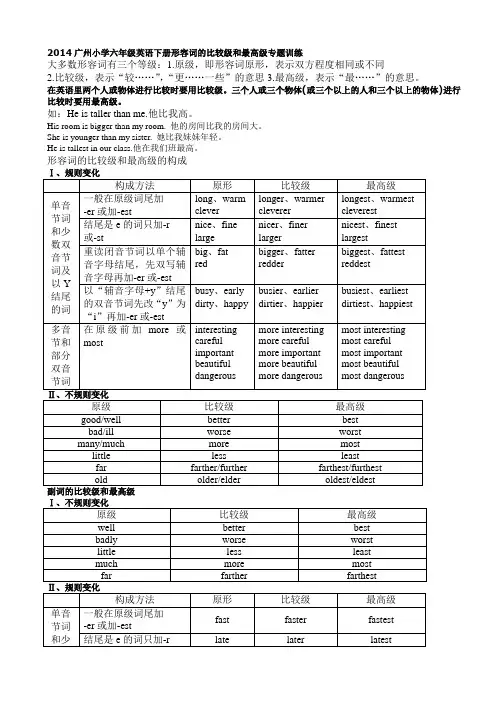
2014广州小学六年级英语下册形容词的比较级和最高级专题训练大多数形容词有三个等级:1.原级,即形容词原形,表示双方程度相同或不同2.比较级,表示“较……”,“更……一些”的意思3.最高级,表示“最……”的意思。
在英语里两个人或物体进行比较时要用比较级。
三个人或三个物体(或三个以上的人和三个以上的物体)进行比较时要用最高级。
如:He is taller than me.他比我高。
His room is bigger than my room. 他的房间比我的房间大。
She is younger than my sister. 她比我妹妹年轻。
He is tallest in our class.他在我们班最高。
形容词的比较级和最高级的构成形容词的用法:一、形容词原级的用法表示双方程度相同(即年龄、高矮等等)或不同时用形容词原级。
肯定式用as……as(和/与……一样)表示;否定式用not as……as或not so……as(和/与……不一样)表示。
as……as的中间用形容词和副词原级。
She is as tall as I.她和我一样高。
Lesson Five is as difficult as Lesson Four.第五课和第四课同样难。
He is not as old as you.他没有你那么老。
Lily is not as careful as Linda.莉莉不如琳达细心。
1.肯定句的句式结构是:A+be动词+as+形容词原级+as+B(表示A、B两者比较程度相同)。
This film is as interesting as that one.这部电影和那部电影一样有趣。
Her handwriting is as good as his.她的书写于他的一样好。
Mary is as careful as Linda.玛丽和琳达同样细心。
2.否定句的句式结构是:A+be动词+not+as+形容词原级+as+B(=A+be动词+not+so+形容词原级+as+B)(表示A、B两者程度不同,即A不如B那么……)Spring is not as/so cold as winter.春天不像冬天那么冷。
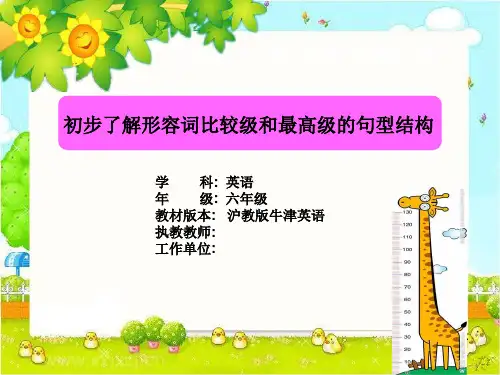
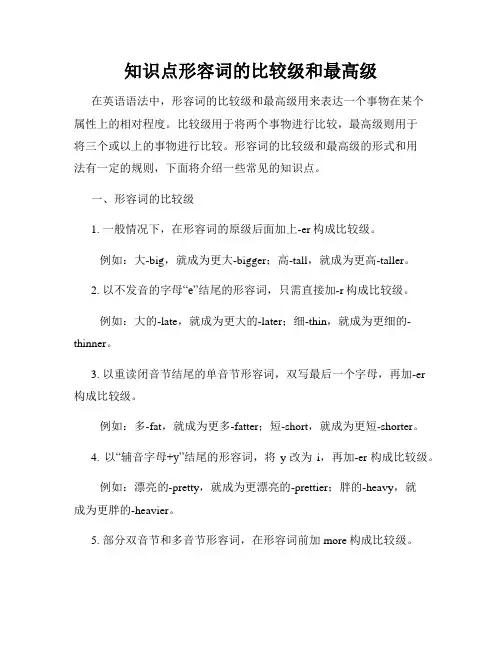
知识点形容词的比较级和最高级在英语语法中,形容词的比较级和最高级用来表达一个事物在某个属性上的相对程度。
比较级用于将两个事物进行比较,最高级则用于将三个或以上的事物进行比较。
形容词的比较级和最高级的形式和用法有一定的规则,下面将介绍一些常见的知识点。
一、形容词的比较级1. 一般情况下,在形容词的原级后面加上-er构成比较级。
例如:大-big,就成为更大-bigger;高-tall,就成为更高-taller。
2. 以不发音的字母“e”结尾的形容词,只需直接加-r构成比较级。
例如:大的-late,就成为更大的-later;细-thin,就成为更细的-thinner。
3. 以重读闭音节结尾的单音节形容词,双写最后一个字母,再加-er构成比较级。
例如:多-fat,就成为更多-fatter;短-short,就成为更短-shorter。
4. 以“辅音字母+y”结尾的形容词,将y改为i,再加-er构成比较级。
例如:漂亮的-pretty,就成为更漂亮的-prettier;胖的-heavy,就成为更胖的-heavier。
5. 部分双音节和多音节形容词,在形容词前加more构成比较级。
例如:有趣的-interesting,就成为更有趣的-more interesting;美丽的-beautiful,就成为更美丽的-more beautiful。
二、形容词的最高级1. 一般情况下,在形容词的原级后面加上-est构成最高级。
例如:大-big,就成为最大-biggest;高-tall,就成为最高-tallest。
2. 以不发音的字母“e”结尾的形容词,只需直接加-st构成最高级。
例如:大的-late,就成为最大的-latest;细-thin,就成为最细的-thinnest。
3. 以重读闭音节结尾的形容词,双写最后一个字母,再加-est构成最高级。
例如:多-fat,就成为最多-fattest;短-short,就成为最短-shortest。
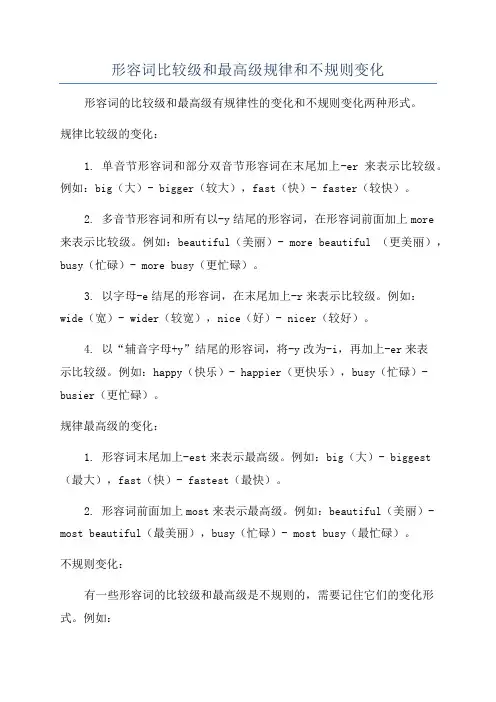
形容词比较级和最高级规律和不规则变化形容词的比较级和最高级有规律性的变化和不规则变化两种形式。
规律比较级的变化:1. 单音节形容词和部分双音节形容词在末尾加上-er来表示比较级。
例如:big(大)- bigger(较大),fast(快)- faster(较快)。
2. 多音节形容词和所有以-y结尾的形容词,在形容词前面加上more来表示比较级。
例如:beautiful(美丽)- more beautiful (更美丽),busy(忙碌)- more busy(更忙碌)。
3. 以字母-e结尾的形容词,在末尾加上-r来表示比较级。
例如:wide(宽)- wider(较宽),nice(好)- nicer(较好)。
4. 以“辅音字母+y”结尾的形容词,将-y改为-i,再加上-er来表示比较级。
例如:happy(快乐)- happier(更快乐),busy(忙碌)- busier(更忙碌)。
规律最高级的变化:1. 形容词末尾加上-est来表示最高级。
例如:big(大)- biggest (最大),fast(快)- fastest(最快)。
2. 形容词前面加上most来表示最高级。
例如:beautiful(美丽)- most beautiful(最美丽),busy(忙碌)- most busy(最忙碌)。
不规则变化:有一些形容词的比较级和最高级是不规则的,需要记住它们的变化形式。
例如:1. good(好)- better(较好)- best(最好)2. bad(坏)- worse(较坏)- worst(最坏)3. many(多)/much(多)- more(更多的)- most(最多的)4. little(小)- less(较小)- least(最小)需要注意,有些形容词的比较级和最高级既可以使用规律变化形式,也可以使用不规则变化形式,根据上下文来决定使用哪种变化形式。
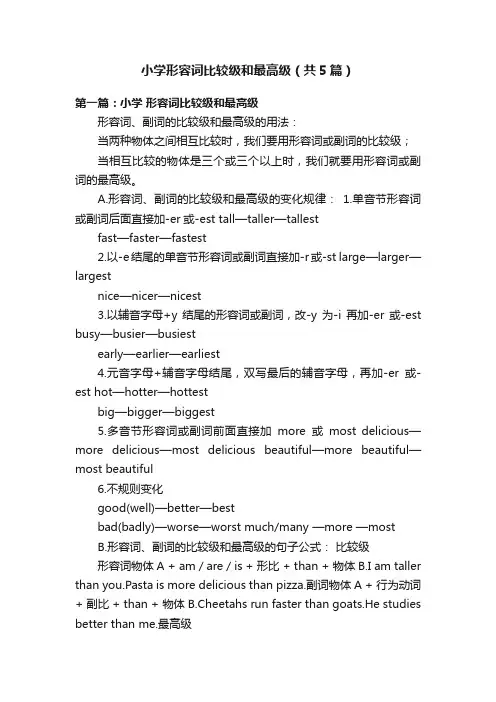
小学形容词比较级和最高级(共5篇)第一篇:小学形容词比较级和最高级形容词、副词的比较级和最高级的用法:当两种物体之间相互比较时,我们要用形容词或副词的比较级;当相互比较的物体是三个或三个以上时,我们就要用形容词或副词的最高级。
A.形容词、副词的比较级和最高级的变化规律:1.单音节形容词或副词后面直接加-er或-est tall—taller—tallestfast—faster—fastest2.以-e结尾的单音节形容词或副词直接加-r或-st large—larger—largestnice—nicer—nicest3.以辅音字母+y结尾的形容词或副词,改-y为-i再加-er或-est busy—busier—busiestearly—earlier—earliest4.元音字母+辅音字母结尾,双写最后的辅音字母,再加-er或-est hot—hotter—hottestbig—bigger—biggest5.多音节形容词或副词前面直接加more或most delicious—more delicious—most delicious beautiful—more beautiful—most beautiful6.不规则变化good(well)—better—bestbad(badly)—worse—worst much/many —more —mostB.形容词、副词的比较级和最高级的句子公式:比较级形容词物体A + am / are / is + 形比 + than + 物体B.I am taller than you.Pasta is more delicious than pizza.副词物体A + 行为动词+ 副比 + than + 物体B.Cheetahs run faster than goats.He studies better than me.最高级1)物体A + am / are / is + the + 形最高级 + 比较范围(of + 人/物,in +地方).I am the tallest in the class.Pasta is the most delicious food of the three.2)物体A + 行为动词 + 副词最高级 + 比较范围(of + 人/物,in + 地方).Cheetahs run fastest in the world.He studies best of us.一.词形变换。
小学六年级形容词、副词的比较级和最高级】编辑整理:尊敬的读者朋友们:这里是精品文档编辑中心,本文档内容是由我和我的同事精心编辑整理后发布的,发布之前我们对文中内容进行仔细校对,但是难免会有疏漏的地方,但是任然希望(小学六年级形容词、副词的比较级和最高级】)的内容能够给您的工作和学习带来便利。
同时也真诚的希望收到您的建议和反馈,这将是我们进步的源泉,前进的动力。
本文可编辑可修改,如果觉得对您有帮助请收藏以便随时查阅,最后祝您生活愉快业绩进步,以下为小学六年级形容词、副词的比较级和最高级】的全部内容。
六年级英语总复习形容词、副词的比较级和最高级一般来说,中文意思是“……的"的词是形容词,而中文意思是“……地”的词是副词.一、形容词概念形容是用来修饰物体的形状,大小,长度,属性,特点等,位于名词的前面。
如:1.He is a hard-working student.(努力的→特点)2.Our English teacher has long hair.(长的→长度)3.The elephants are very big, and the mice are very small.(大的、小的→大小)二、形容词、副词比较级和最高级的意义英语中的形容词和副词,在句子里表示“比较……”、“最……"时,要用特别的形式,即:比较级和最高级.原来的形式称为原级。
如: long longer longest原级比较级最高级1.The black pen is very long. 黑色的钢笔很长。
2.The blue pen is longer than the black one. 蓝色的钢笔比黑色的长.3.The red pen is the longest of the three. 红色的钢笔是三支中最长的。
三、形容词、副词比较级的用法表示两者间的比较用比较级。
其常见句式有:1.“A + be +形容词比较级 + than + B”意思为“A比B更……”。
课前准备:检查学生掌握单词情况(听写)一、形容词、副词的比较级和最高级的构成规则1.一般单音节词和少数以-er ,-ow 结尾的双音节词,比较级在后面加-er ,最高级在后面加-est;(1)单音节词如: small→smaller→smallest short→shorter→shortesttall→taller→tallest great→greater→greatest(2)双音节词如: clever→cleverer→cleverest narrow→narrower→narrowest2.以不发音e 结尾的单音节词,比较在原级后加-r ,最高级在原级后加-st ;如:large →larger →largest nice →nicer →nicest able →abler →ablest3.在重读闭音节(即:辅音+元音+辅音)中,先双写末尾的辅音字母,比较级加 -er ,最高级加 -est ;如: big →bigger →biggest hot →hotter →hottest fat →fatter→fattest 4.以“辅音字母+ y”结尾的双音节词,把y改为i,比较级加-er,最高级加-est;如: easy→easier→easiest heavy→heavier→heaviestbusy→busier→busiest happy→happier→happiest5.其他双音节词和多音节词,比较级在前面加more,最高级在前面加most;如: beautiful→more beautiful→most beautifuldifferent→more different→most differenteasily→more easily→most easily注意:(1)形容词最高级前通常必须用定冠词the,副词最高级前可不用。
例句:The Sahara is the biggest desert in the world.(2)形容词most 前面没有the ,不表示最高级的含义,只表示"非常"。
形容词比较级和最高级的变化规则形容词的比较级和最高级的变化规则如下:1.单音节形容词和部分双音节形容词:- 比较级:在形容词后面加上-er,如tall(高)→ taller(更高)- 最高级:在形容词前面加上the most,如tall(高)→ thetallest(最高的)2.以字母e结尾的双音节形容词:- 比较级:在形容词后面加上-r,如wide(宽)→ wider(更宽)- 最高级:在形容词后面加上-st,如wide(宽)→ widest(最宽的)3.以辅音字母+y结尾的双音节形容词:- 比较级:将y改为i,再加上-er,如happy(快乐)→ happier(更快乐)- 最高级:将y改为i,再加上-est,如happy(快乐)→ happiest (最快乐的)4.多音节形容词和部分双音节形容词:- 比较级:在形容词前面加上more,如beautiful(美丽)→ more beautiful(更美丽)- 最高级:在形容词前面加上the most,如beautiful(美丽)→the most beautiful(最美丽的)5.部分不规则形容词的比较级和最高级:- good(好)→ better(更好的)→ the best(最好的)- bad(坏)→ worse(更糟糕的)→ the worst(最糟糕的)- little(小)→ less(更少的)→ the least(最少的)- much(多)→ more(更多的)→ the most(最多的)- far(远)→ farther/further(更远的)→ the farthest/the furthest(最远的)需要注意的是,有些形容词的比较级和最高级是不规则变化的,需要单独记忆,如big(大)→ bigger(更大的)→ the biggest(最大的)等。
形容词的比较级和最高级用法
1. 在英语中,在表示“比较…”和“最…”时,形容词要用特别的形式,称为“比较级”和“最高级”,原来的形容词称为“原级”:
原级比较级最高级
strong强 stronger较强 strongest最强
2. 形容词的比较级和最高级的构成方法如下:
a. 单音节词和少数双音节词以加-er和-est的方式构成:
原级比较级最高级
young年轻 younger较年轻 youngest最年轻
old老 older较老 oldest最老
clean干净 cleaner较干净 cleanest最干净
在加词尾时要注意下面的各种情况:
情况加词尾法例词
一般情况直接加词尾small, smaller, smallest 以e结尾的词加-r,-st large, larger, largest 以辅音+y结尾的词变y为i,再加词尾busy, busier, busiest 以“辅音字母”结尾的词将这字母双写再加词尾big, bigger, biggest
b. 其他词都在前面加more, most构成比较级及最高级:
原级比较级最高级
important more important most important
difficult more difficult most difficult
interesting more interesting most interesting
II. 在空格中填入所给形容词的适当形式:
1. She is two year ___ than me. She’s the ___ girl in our class. (young)
2. Bill is ___ than Tom. He’s the ___ of the three children. (old)
3. John is the ___ boy in the class. (clever)
4. Cairo is the ___ city in Egypt. (big)
5. Her bicycle is ___ than mine. (good)
6. My cold is ___ today than it was yesterday. (bad)
7. Tokyo is ___ from Beijing than from Shanghai. (far)
8. This question is ___ than the other one. (simple)
9. This street is ___ than Beijing Road. It’s actually the ___ street in the whole city. (narrow)
10. It is ___ in Hong Kong than in Kunming. (hot)
11. My cold is getting ___. (bad)
12. The ___ man has the ___ leisure. (busy, much)
13.I didn’t have the ___ desire to go to bed. (little)
14. Manchester is ___ from London than Oxford. (far)
15. They made ___ arrangements. (far)
16. I’ll try to make ___ mistakes in future. (few)。